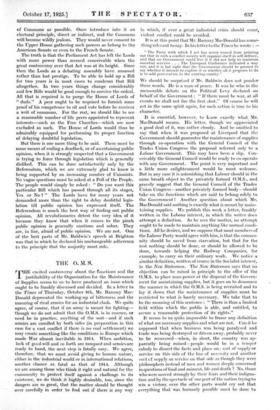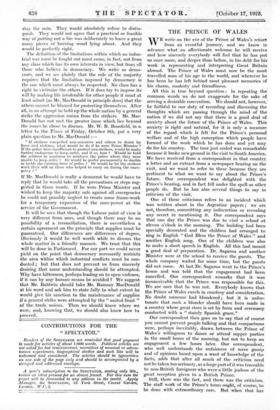THE O. M. S.
HE excited controversy about the functions and the rp justifiability of the Organization for the Maintenance of Supplies seems to us to have produced an issue which ought to be frankly discussed and decided. In a letter to the Times of Thursday, October 8th, Mr. Ramsay Mac- Donald deprecated the working-up of bitterness and the manning of rival armies for an industrial clash. We quite agree, of course, that if an army is meant for fighting— though we do not admit that the O.M.S. is in essence, or need be in practice, anything of the sort—and if such armies are enrolled by both sides (in preparation in this case for a vast conflict if there is no coal settlement) we may create something like the conditions in Europe which made War almost inevitable in 1914. When ambition, lack of gccd will and so forth are rampant and armies are ready to hand, the next step is fatally easy. We agree, therefore, - that we must avoid giving to human nature, either in the • industrial world or in international relations, another chance as fatal as that of 1914. Although we are among those who think it right and natural for the community to protect itself against a challenge to its existence, we do think • it highly desirable, too, since the dangers are so great, that the matter should be thought over carefully in order to find out if there is any way in which, if ever a great industrial crisis should come, violent conflict could be avoided; It is at this point that Mr. Ramsay MacDonald has some- thing relevant to say. In his letter tothe Times he wrote :- " The Party with which I act has never ceased from pointing out that in such a conflict society will organize itself in self-defence, and that no Government could live if it did not help to maintain essential services . . . The Liverpool Conference indicated a way out, and it is but right that the Government should be pressed to say whether it intends to explore it or whether all it proposes to do is to add provocation to the existing enmity."
We should be surprised if Mr. Baldwin does not ponder these words. He is a man of peace. It was he who in the memorable debate on the Political Levy declared on behalf of the Government : " If there must be war, at all events we shall not fire the first shot." Of course he will act in the same spirit again, for such action is true to his character.
It is essential, however, to know exactly what Mr. MacDonald means. His letter, though we appreciated a good deal of it, was rather cloudy. And he omitted to say that when it was proposed at Liverpool that the Government should guarantee the maintenance of supplies through co-operation with the .General Council of the Trades Union Congress the proposal referred only to a Labour Government. This may have been a slip. Con- ceivably the General Council would be ready to co-operate with any Government. The point is very important and a little more enlightenment. would be most welcome. But in any case it is astonishing that Labour should in the same breath object to the privately formed °ALS:, and gravely suggest that the General Council of the Trades Union Congress—another privately formed body—should take on the functions which are said to belong solely to the Government ! Another question about which Mr. MacDonald said nothing is exactly what is meant by main- taining supplies. We publish this week a letter, - frankly written in the Labour interest, in which the writer does attempt a definition. As he sees the matter, no attempt ought to be made to maintain anything like normal condi- tions. All he desires, and we suppose that most members of the Labour Party would agree with him, is that the commu- nity should be saved from starvation, but that for the rest nothing should be done, or should be allowed to be done, towards helping the Railway Companies, for example, to carry on their ordinary work. We notice a similar definition, written of course in the Socialist interest, in the New Statesman. The New Statesman says that no objection can be raised in principle to the offer of the O.M.S. to place man-power at the disposal of the Govern- ment for maintaining supplies, but it goes on to denounce the manner in which the O.M.S. is being recruited and to lay it down that the maintenance of .supplies must be restricted to what is barely necessary. We take that to be the meaning of this sentence : " There is thus a limited field within which the public is able, and entitled, to secure a reasonable protection of its rights." .
It seems to us quite impossible to frame any definition of what are necessary supplies and what are not. Can it be supposed that when business was being paralysed and trade was being destroyed or driven away, probably never to be recovered—when, in short, the country was ap- parently being ruined—people would be in a temper calmly to dissect the facts and place one sort of supply or service on this side of the line of necessity and another sort cf supply or service on that side as though they were philosophers instead Of men and women deeply concerned in questions of food and raiment, life and death ? No, those who were moved strongly by their fears and their indigna- tion and by the spectacle of one part of the nation trying to win a victory_ over the. other . parts would cry out that everything that was humanly possible must be done to stay the -ruin. They would absolutely refuse to distin- guish. They would not agree that a practical or feasible way of putting out a fire was deliberately to leave a great many pieces of burning wood lying about. And they would be perfectly right.
The definition of the limitations within which an indus- trial war must be fought out must come, in fact, not. from any class which has its own interests in view, but from all those who believe in democracy. We write as demo- crats, and we sec plainly that the rule of the majority requires that the limitation imposed by democracy is the one which must always be respected. No class has a right to victimize the others. If it does try to impose its will by making life intolerable for other people it must at least admit (as Mr. MacDonald in principle does) that the others cannot be blamed for protecting themselves. After all in an attempt to hold up the whole nation by a general strike the aggression comes from the strikers. Mr. Mac- Donald has not met the greater issue which lies beyond the issues he chose to discuss. Mr. W. R. Bousfield, in a letter to the Times of Friday, October 9th, put a very plain question to Mr. MacDonald :- " If strikers compelled non-unionists and others to desist by force and violence, what would he do if he were Prime Minister ? If the police were insufficient to protect non-strikers, would he make further endeavour to keep order, and if so, how ? Would he hold the soldiers in readiness to reinforce the police where they were unable to keep order ? Or would he prefer permanently to double or treble the existing force of police ? Or would he let the strikers work their will on those who helped to carry on during the emer- gency ? "
If Mr. MacDonald is really a democrat he would have to reply that he would take all the precautions or steps sug- gested in those words. If he were Prime Minister and wished to keep the majority safe against all emergencies he could not possibly neglect to create some frame-work for a temporary expansion of the man-power at the service of the Government.
It will be seen that though the Labour point of view is very different from ours, and though there may be no possibility of a reconciliation, there is nevertheless a certain agreement on the principle that supplies must be guaranteed. Our differences are differences of degree. Obviously it would be well worth while to discuss the whole matter in a friendly manner. We trust that this will be done in Parliament. For our part we could never yield on the point that democracy necessarily restricts the area Within which industrial conflicts must be con- ducted ; but that does not prevent us from sincerely desiring that some understanding should be attempted. Why have bitterness, perhaps leading on to open violence, if it can by any human means be avoided ? We suggest that Mr. Baldwin should take Mr. Ramsay MacDonald at his word and ask him to state fully to what extent he would give his Sanction to the maintenance of supplies if a general strike were attempted by the " united front " of the trade unions. Then we should know where we were, and, knowing that, we should also know how to proceed.



















































 Previous page
Previous page